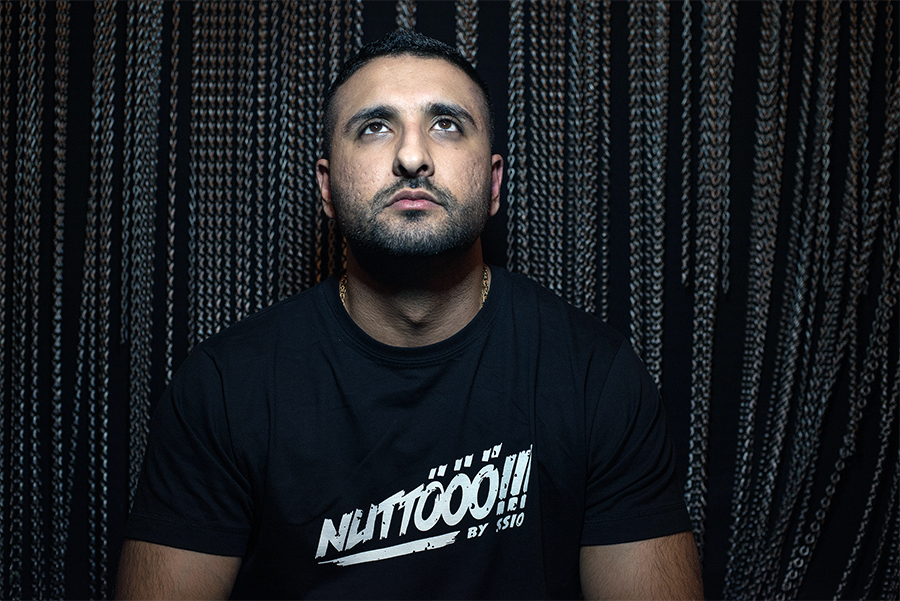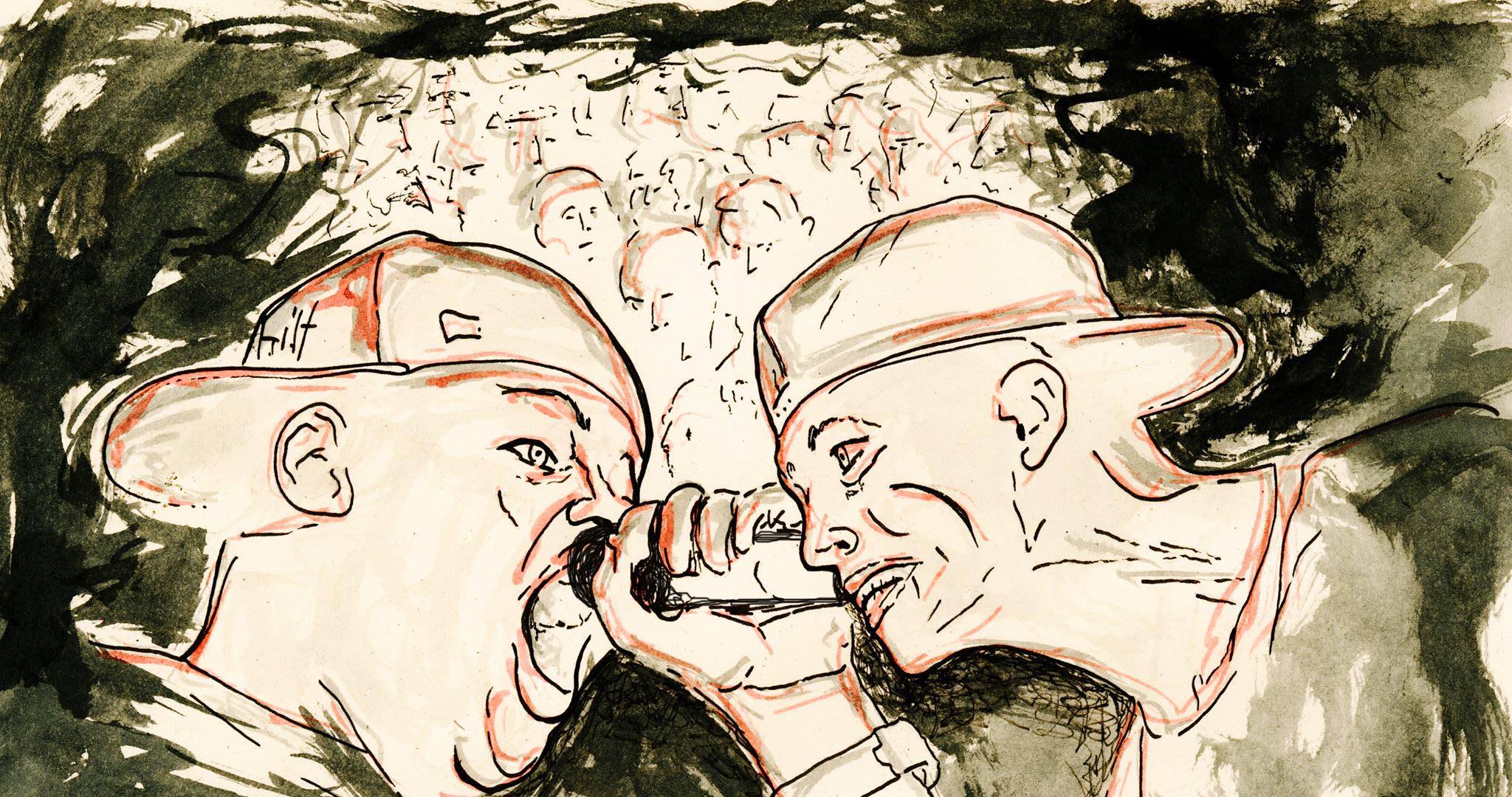früher Deschek vom Message, heute nur noch als Wödscheim-Co-Host aktiv.
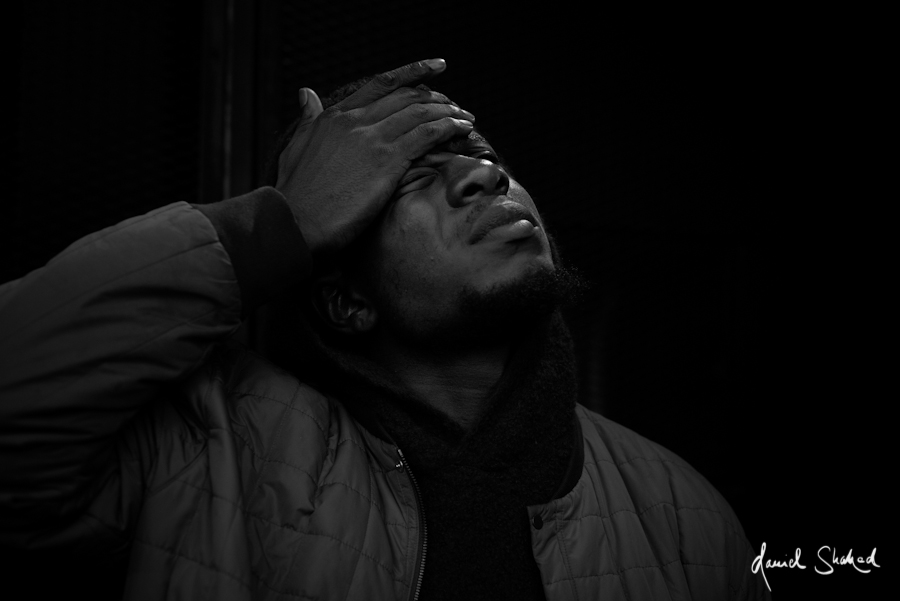
Kurz vor seinem Wien-Auftritt in der Grellen Forelle nimmt sich Mick Jenkins, der bei seiner Europa-Tour von einigen Homies und Künstler-Kollegen begleitet wird, Zeit für ein tiefgründiges Gespräch. Der groß gewachsene Rapper aus Chicago hat heuer in Kooperation mit der Cinematic Music Group sein Debüt-Album „The Healing Component“ veröffentlicht, nachdem er in den vergangenen Jahren bereits einige Mixtapes und EPs herausgebracht hatte. Neben den Leitmotiven des neuen Albums – etwa Liebe und Selbstreflexion – erzählt er im Interview mit The Message von seinem Zugang zum Christentum, den grundlegenden Problemen im US-Gefängnissystem sowie den Hintergründen zum „Drowning“-Video. Darüber hinaus betreibt Mick Jenkins Ursachenforschung zur anhaltenden rassistischen Polizei-Brutalität in seiner Heimat.
Interview: Simon Nowak & Daniel Shaked
Mitarbeit: Wanja Bierbaum
Fotos: Daniel Shaked
The Message: On „The Healing Component“ you talk a lot about honest love and self-reflection. Do you think that nowadays more artists are brave enough to make emotionally honest hip hop music?
Mick Jenkins: Yeah, I think more people are brave enough to do it. I think there were people doing it for a long time, it just wasn’t popular. When something is popular or more in notoriety we tend to think that more people are doing it. When it’s really the same amount of people, it’s just a new amount of attention, that’s how I feel about that.
The thought of spreading love is nothing new, especially when we take a look at the bible: „Love your neighbour as yourself“ – do you still feel that spirit in modern Christianity?
Absolutely. Lining myself with the same vision of Jesus with a message that centers on love was exactly what I was trying to do and is exactly where I got it from. My faith is Christian-based and that’s what’s kinda been the foundation for a lot of my morals and understanding of the world.
How do you live and express your faith these days?
You know, through my music, through my life. It’s not anything that’s perfect. I never try to come off like I’m righteous or holier-than-thou or anything like that. It’s just a journey, it’s a struggle, a straight path. I make mistakes, I pray about it, I’m honest. I think that’s a big thing. I think a lot of people aren’t honest with themselves, about their condition, the state that they’re in or the things they’re doing or the decisions they’re making. Above all I’m just trying to be honest with myself and those who are around me, but making sure that I am trying to be a better person, trying to live a certain way. But it’s not anything that’s perfect or that’s done without flaw.
Is your belief affected by institutions like the pope or the church?
Yeah, the church affects it. I don’t really know too much about Catholicism. The pope is a foreign thing to me, I don’t really understand that system, so I just leave it there. But even my own church in America – The Christian Church – really gives a wrong idea about how spirituality and Christianity should be. I think the church makes people feel like they have to get right before they come to church when the truth to the matter is you can’t get right without god. We condemn people for their mistakes, we push people away for their mistakes and this isn’t the way that Jesus or God would have operated at all via the bible. So I think the church gives a lot of misconceptions.
How do you think the church could get more up to date without losing its basic principles?
I don’t know, I wouldn’t say that the church isn’t up to date. I follow the bible, King James Version and there are enough things in the bible that the church isn’t doing. It’s not even a thing of like getting back to somewhere without losing something, it’s just about doing what we are supposed to do. I think of a bible story: There’s a woman who was caught cheating on her husband and the people wanted to stone her. But Jesus was there and he said: „Let him who is without sin cast the first stone.“ Nobody could throw a stone and that’s indicative of the judgement that we have with each other. We shouldn’t be judging each other, we shouldn’t be condemning each other for mistakes, we shouldn’t be keeping people out of the church or out of positions. I’ve had a friend in church who got pregnant out of wedlock and she was stripped of all these things and alienated. This is not Jesus. This isn’t what Jesus does. He was around the whores, the taxmen and the Pharisees and the people who needed him the most and that’s not the way that the church acts as a whole. They just need to get back to those things (laughs). Honestly, it’s not too hard to figure out what needs to be done. And we can also easily see the ramifications of how they’ve been operating like I just mentioned.
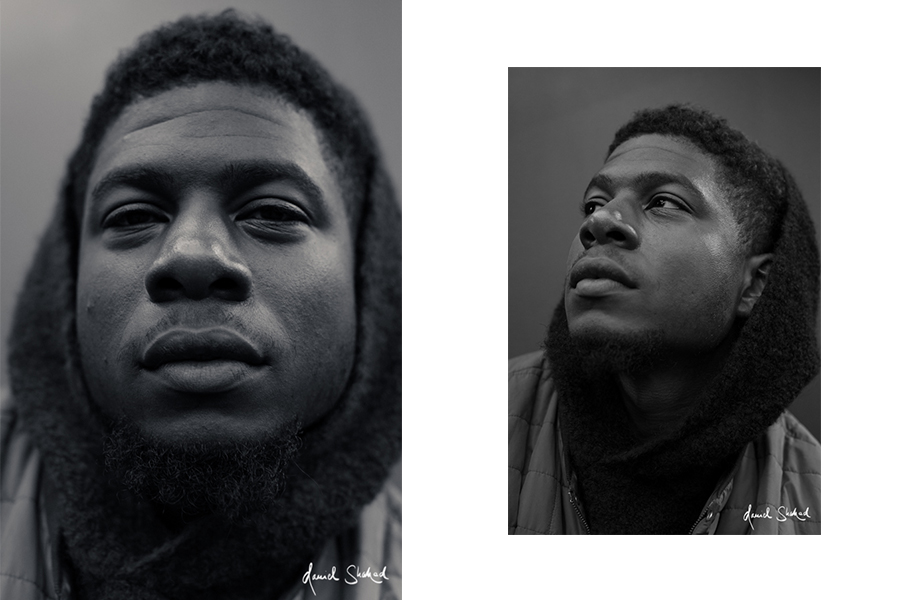
There’s a thriving scene of Christian rappers built around Rapzilla and Lecrae. How do you feel about the tag „Christian rap“?
I know Lecrae and there’s a guy I like named Stephen the Levite, I don’t know if he is still making music, it was a while ago. He used to invert bible stories on rap songs, that was pretty cool. But I don’t know, I don’t really listen to Christian rap and I don’t know how to feel about that. Honestly, I think you shouldn’t really try to merge the two. I don’t really feel like you should call something Christian rap, I just feel like if you are a Christian, you should rap about whatever you want.
Including your values.
Yeah, your values. And that’s when I look at that, people could call my music Christian rap if they want to, but I wouldn’t. I think it’s just rap. I talk about my life, I talk about my values and just because you hear it and just because I am who I am and I speak about what I do or what I believe, you hear the Christian values, the spirituality, but it does not consume my music. It’s not necessary for me to come at you with: „Hey, I’m a Christian rapper“. Whether it’s just poetry or call it gangsta rap (laughs).
Which are the values a modern man could build on?
Honesty. I think a lot of people are afraid to acknowledge the truth of a matter in a lot of different situations. I think people got to be a lot more honest with themselves, with the world and with the people around them. A lot of things are coming into question about men, especially as it relates to women and gender roles and I just feel like n**gas be denying the truth. I think that’s the number one thing people need to build on, just honesty about the truth of a situation.
„The Healing Component“ is often compared to „The Miseducation of Lauryn Hill“. In hip hop, speaking about honest love seems to be much easier from the feminine perspective. How do you see the modern man who is stuck between the old and the new image in terms of talking about emotions?
Drake did a lot for that. I think just artists in general are more comfortable exposing parts of themselves, just because of how popular introspective rap got with his emergence, but I don’t know. I don’t think about that a lot, I’m really worried about myself more than anything. I think that the modern man is a little bit too frail when it comes to talking about feelings or love or things of that nature. I mean I have a hard time doing it, especially with other men. Often we talk about love anyway it is just limited to our relationship situation. It’s limited to a romantic situation and it’s often not with the most ideal values for a relationship or a romantic situation, so it’s just very stunted and to go deep as far as „The Miseducation of Lauryn Hill“ or what I’ve just done with this album, it’s not something we hear a lot, it’s definitely not like I talk about it at all and I think that has a lot to do with the stigma men carry around about talking about such things.
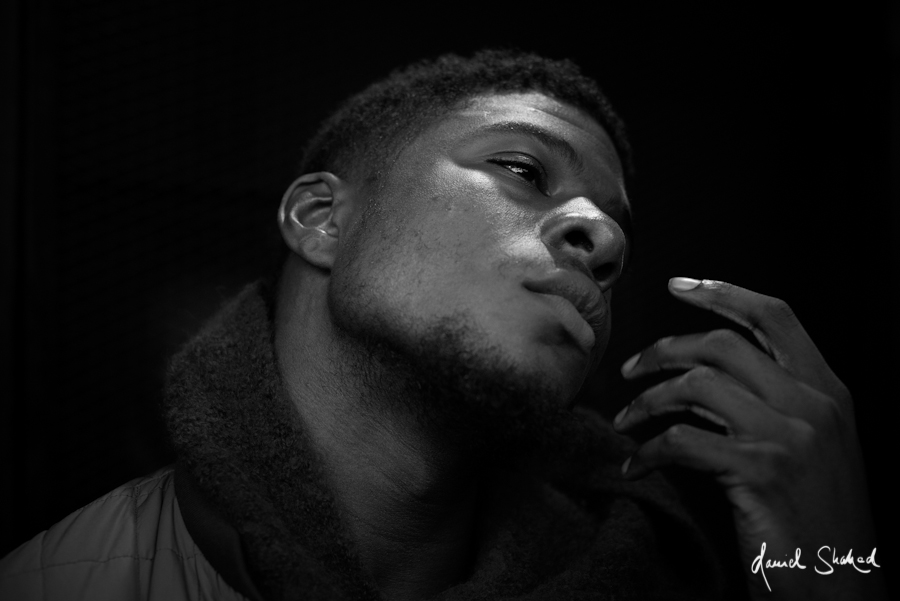
In 2013, you weren’t able to pay the fine after being caught with marijuana. You had to spend 34 days in prison, lost your regular job and started becoming a full-time musician. What did you experience in jail and what were you able to take away from that time?
I experienced a lot and I could be talking for hours about that shit. Just the system, honestly. I experienced how much people outside don’t care at all, cuz they don’t know. Just injustice like people developing a whole new mindset, a whole new currency, a whole new language, a whole new way of being. I was in for 34 days with people who were five, ten or twenty years or even their lifetime. I hesitate to speak about it as if I know completely. I got a glimpse, a sliver of the reality that some people face for the rest of their lives and the reality is that we are not rehabilitating people. This whole shit is really unfair, like to just keep somebody caged up for 30 years for a mistake that they made, whether that be a murder, or a rape, or something. You just put them in a cell. To do all that and not try to rehabilitate somebody is not humane.
Is it even possible to rehabiliate the cruel ones, for instance a serial killer?
I mean, talk to them. I’m not saying: „Oh, he’s got mental help for three years, let him go!“ I’m not saying that, but it doesn’t make sense to put somebody in a corner and just leave him there for 30 years. I mean how should that help? How does that even make the person who is a victim feel better? It just answers what we’ve been programmed to think that this is what’s supposed to happen. I experienced being in there looking at things first-hand and looking at all the fucked up shit as somebody who got caught with residue in a grinder. Like what if I had an ounce with me? I would’ve been there a lot longer than 34 days. For possession of a plant that is legal in like seven states now, you know? (laughs). What was done to correct that behavior? Not anything, really. People are left with very limited options once they get out, they kinda push them into a cycle of going back in, they kinda strip them of the chance of a real life. And why? For money! It’s not even like a conspiracy, cuz there are facts, there are documentaries that show us why prison is really the way it is. So it’s just fucked up and I experienced it first-hand. It goes a lot deeper than that once you start talking about the mindsets of the people that are in there and the things that they come to accept about their lives. It’s fucked up.
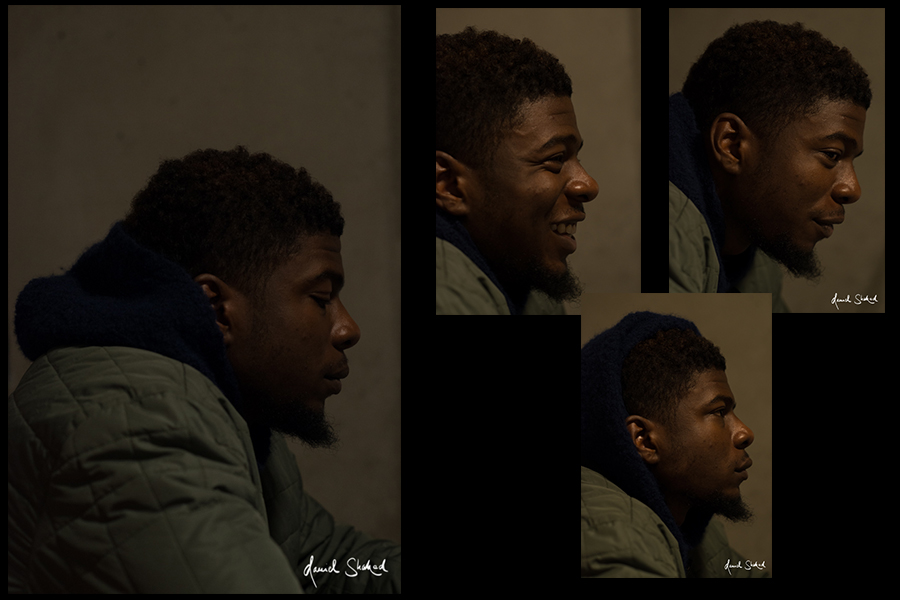
But didn’t it really start when the prison system was privatized?
I think it didn’t start when it was privatized, that just made things a lot worse.
In California they were just trying to pass a law…
Yeah, I heard about it, that they’re trying to put it back into the states hands and not have it privatized and not have it be for profit.
Plus rehabilitating people who are doing time for small possession charges.
There are prisons that do that. There are prisons that cater for those kinds of needs, but not for the entire population. We are talking about a very small percentage of people versus the number of people that actually are in prison and locked up. A large number of those people are locked up for non-violent crimes.
The „Drowning“ video is often brought up in connection with the Eric Garner incident. In times of Michael Brown and Ferguson: How did you perceive the situation of increasing racially-motivated police brutality while being in Chicago?
I was been experiencing stuff like that all my live, honestly. It’s not something that black people are new to at all, since we got here (laughs). So, it’s just another version of that and that song wasn’t just about Eric Garner. „I can’t breathe“ is a statement that speaks for everything. It’s a very deep question. Not deep, but like there’s an extensive answer that I don’t care to really get into. I think it doesn’t matter how I dealt with it, it matters that it’s happening and nobody is dealing with that, with the fact that it’s happening so easily, so frequently, on camera, with no restitution or retribution at all. That’s what I think that matters more. I’m hurt, I’m embarrassed and it could happen to me. I can deeply talk about those things for hours, but that’s just like he [Anm. d. Red.: points at his drummer] feels, like my friends feel, like my family feels. I mean, how many times do people wanna hear that? It doesn’t matter to me how I feel about it. I care more about how the people who have the power to change stuff feel, knowing what is happening in there and they aren’t doing anything.
Do you feel that artists or musicians play a part in changing that attitude?
No. I think I have a part, I claim a part, I try. But I don’t think there’s anything I can do, I don’t think there’s anything we can do. There’s a system in place that allows this and until that shit gets broken down it’s gonna continue to happen.
What would need to happen to break that system down?
Redo it, take it out, put a new one in. You can’t just change aspects of it. As far as that goes, we need to change how we hire police, we need to change how long it takes, what they’re taught about how to subdue criminals. Clearly they can do it with white people who kill thirty people. They’re always able to apprehend them safely (laughs). So, it’s something that can be done, it’s something that can be taught, it’s something that can be learned, but that’s literally a resurgence of the whole system. And in that extend beyond the police, just the system in America, in the world, in general. It speaks to what we’re really here for and it’s not for the life and liberty, freedom of, you know, everybody. We’ll literally have to snatch out the system and put in a new one and the powers that be. But how are we gonna do that? There are things that I can do to affect people. I can help change people’s minds and open people’s minds and that’s what I’m doing, but to change the state of things? Nah.
Thanks for the interview, Mick!
Thank you, man! Sorry, some of that shit is just hella touchy to talk about. I don’t feel like it matters so much how I feel about in this Eric Garner situation, to be talked about, over and over, excessively, interview after interview after interview, because that’s not the point. Nobody thinks it feels good. Of course it’s negative feelings and we could talk about it for hours, but they’re all gonna be negative.
Is especially foreign media out here in Europe focused on that aspect?
Media in general, not even just foreign media, just period. Because we’re focused on wrong things. When people do wanna talk about it, they wanna talk to something that relates to it, they wanna talk about how I feel. They don’t go talk to white people in their homes that know that it’s happening, they don’t go down to the police station and talk to the officers who are the friends of the officers who killed him and ask them how they feel and what they’re doing. I wanna know what the police officers who are friends of the people who kill these people think. What does his boss think? Those are the things, those are the questions we should be asking and those are the people that we should be talking to. But they’re just talking to more other people who could possibly be victims. The point isn’t how I feel about it. The point is what’s happening and why it’s still happening.
Do you think there are a lot of bystanders?
Apathetic bystanders, have you heard the term before? There’s a story of a woman who got stabbed like twenty times in a neighborhood where there were like 14 witnesses. They all saw it, but nobody came out to stop. That’s what’s happening! People are getting killed in the streets and everybody sees it, but nobody is coming in.
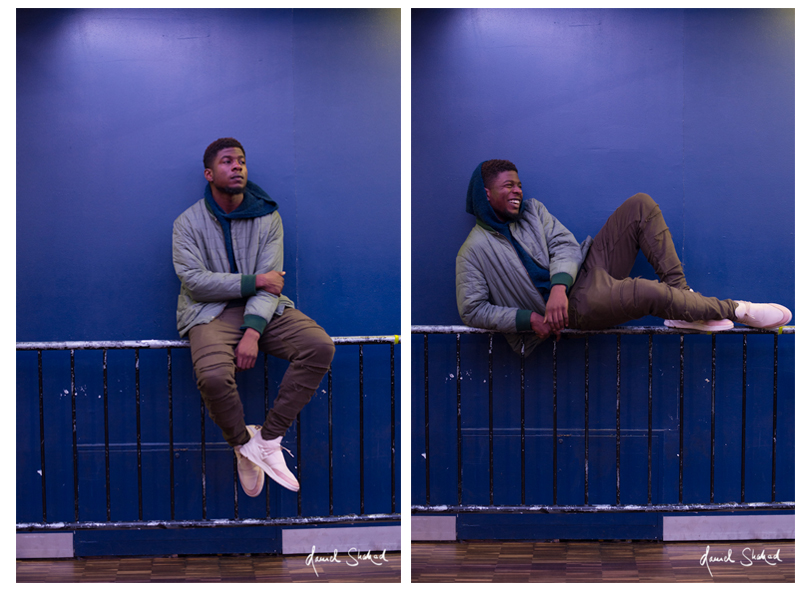
Have you ever tried to talk to the police?
Nah, absolutely not. I don’t deal with the police. I’m not trying to deal with the police in any way. It’s not my job. I don’t wanna talk to one police officer. I can, but he ain’t the problem. The police officer is probably gonna listen to me and could be affected by what I say, but he’s not the person I’d need to be talking to. The person I’d need to be talking to is the one who’s not listening. How do we do that? We gotta fuck the system up and just get him outta here, like replace him. There’s a lot of people who wanna be stuck in their ways, there’s a lot of people who don’t wanna see the reality and that’s what i was talking about. There’s a lot of people who look at a situation like the Eric Garner situation and not acknowledge the truth of the matter, not acknowledge that that force was excessive, not acknowledge that he didn’t have to die, not acknowledge that if he was doing something wrong, that’s not how you handle that situation as a police officer anyway. So, I’m not trying to talk to anybody who refuses to be honest about the reality of this situation. For what? They’re not being honest. How do you affect that system without tearing it down? I can’t tell.
Das Review zum Konzert in Wien findet ihr hier.
Ähnliche Posts
- "You have to challenge the society" // Jahson The Scientist Interview
Jahson The Scientist ist ein "Wordsman", der in seinen Ausdrucksformen keine Grenzen kennt. Er ist…
- The Story of a Long Lost Relative // DJ Werd Interview
DJ Werd ist seit Jahren eine Art "graue Eminenz" im deutschen HipHop-Geschehen. Aufgewachsen in San Jose,…
- "I wanted to be a Black Panther or a rapper" // Busdriver Interview
People call me 'Driver'", mit diesen Worten gesellte sich das Indie-Idol der Untergrund-Szene L.A.'s auf den…





